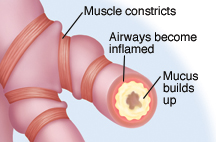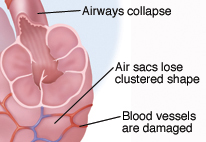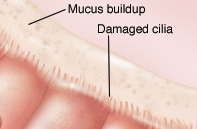What Is COPD?
COPD stands for chronic obstructive pulmonary disease. The airways in your lungs are blocked (obstructed). Because of this, breathing takes more effort. You may have started limiting your activities to avoid shortness of breath. There is treatment for your symtoms. Over time you will not be able to do as much for yourself and need to rely more on others. This can make life less enjoyable.

When Airways Are Blocked (Chronic Bronchitis or Chronic Asthma)
When cells in the airways make more mucus than normal, blockages sometimes result. The mucus builds up, narrowing the airways. This means less air travels into and out of the lungs. The lining of the airways may also become inflamed (swollen), and the muscle surrounding the airways may constrict (tighten). These problems cause the airways to narrow even more.

When Airways Collapse (Emphysema)
When airways are damaged, they lose their stretchiness and become baggy and floppy. Damaged airways may collapse when you exhale, causing air to get trapped in the sacs. This trapped air makes breathing harder. Over time, the air sacs lose their clustered shape. This may mean that less oxygen enters the blood vessels.
 |
| A microscopic view of damaged cilia |
When Cilia Are Damaged
Smoking harms the cilia that line the airways. Damaged cilia can’t sweep mucus and particles away. Some of the cilia are destroyed. This damage makes the problem described on this sheet even worse.
How Did I Get COPD?
Most people get COPD from smoking. Cigarette smoke causes lung damage, which can develop into COPD over many years. You may be diagnosed with COPD if one or more of these problems is preventing air from flowing normally through your lungs:
-
Chronic bronchitis occurs when damaged lungs produce more mucus than they should.
-
Emphysema occurs when damaged lung passages collapse as you breathe out.
-
Chronic asthma occurs when substances in the air cause the lung passages to become inflamed. Asthma can sometimes be reversed with medication. But with chronic asthma, the passages stay inflamed all the time.
How COPD Affects Breathing
COPD makes you work harder to breathe. Air may get trapped in the lungs, which prevents your lungs from filling completely the next time you inhale (breathe in). So, it’s harder to take a deep breath. Over time, your lungs may become enlarged. This makes it more difficult for the lungs to expand fully in the chest. These problems can lead to shortness of breath (also called dyspnea). You may also experience wheezing (hoarse, whistling breathing) and fatigue (feeling tired and worn out).